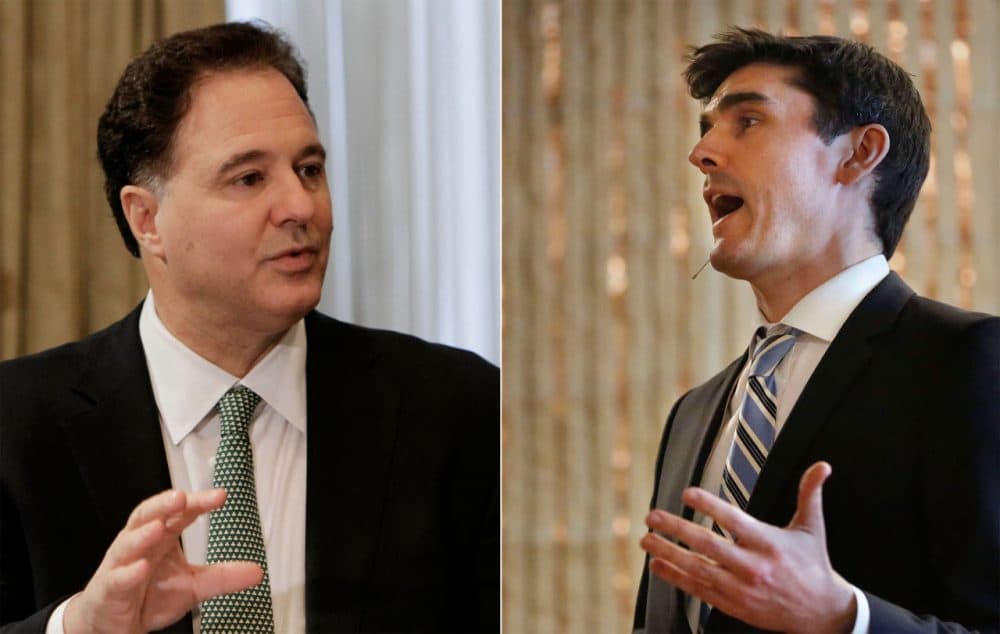Advertisement
Broadcast Olympics Debate Might Help Boston 2024 Up Support, Or It Might Help Opponents

One side wants it to be a game changer. The other wants it to end the games.
Top supporters and opponents of the 2024 Olympics in Boston face off in a prime-time televised debate Thursday (tonight). The hour-long Boston Globe/FOX25 broadcast will also air on WBUR at 8 p.m.
But the first full TV debate on the topic won't be the first TV debate for Boston 2024 Chair Steve Pagliuca.
"I’ll be tireless," Pagliuca promised as a Democratic candidate for the U.S. Senate back in 2009. "I’ll never give up. I’ll never let you down."
Pagliuca will be joined by U.S. Olympic Committee member Dan Doctoroff, the former deputy mayor who led New York City’s bid for the 2012 Summer Games.
Arguing against the supporters will be Smith College economist Andrew Zimbalist and No Boston Olympics Co-Chair Chris Dempsey, who knows what he'll be wearing for the debate. "Blue suit," Dempsey said. "Conservative tie. White shirt. We’re not trying to draw attention to the wardrobes on this one."
Dempsey is no stranger to debates either. He's worked on political campaigns. And he says conventional wisdom suggests he’s doing the wrong thing.
"In a traditional campaign, the advice for whoever’s ahead would be to stay away from debates, to not provide that opportunity to change the game," Dempsey said.
WBUR polls have consistently shown opponents of the Olympics ahead of supporters. But Boston 2024 has something to lose as well.
Steve Koczela, with The MassINC Polling Group, says there’s risk in putting opponents on equal footing.
Advertisement
"Boston 2024 looks much stronger," Koczela said. "They’re much better financed, have many more capabilities as far as their organization is concerned. No Boston Olympics, on the other hand, has raised almost no money."
With little money for conventional advertising, an hour of prime-time TV is appealing to Dempsey.
"It’s a way for us to get our message out there when we’re being outspent literally 1,000 to 1," Dempsey said.
Dempsey said the more information people have, the better. And Boston 2024 said the same.
"We have always said that constructive discussion and healthy debate will only make our bid stronger," said Boston 2024 COO Erin Murphy in a statement. "We look forward to a productive discussion Thursday and hope it will yield more creative ideas to improve what is an innovative and fiscally responsible effort to bring the Olympic and Paralympic Games back to the United States."
So Which Side Has More To Lose From The Debate?
Political strategist Tobe Berkovitz says coming in the middle of the summer, as this debate is, it probably doesn't matter who which side has more to lose.
"I doubt that whether you go to the local ice cream shop or to the beach, that the main topic of conversation is going to be the debate that’s coming up," Berkovitz said. "I just don’t see it on the average person’s radar. Unless there’s a big gaffe one way or the other, I just don’t see this as shifting opinion very much."
But shifting opinion is exactly what Boston 2024 has been told to do. The board of the USOC met late last month with leaders of Boston 2024 and dined with Boston Mayor Marty Walsh. USOC Chair Larry Probst said afterward public support numbers needed to improve "relatively soon."
Berkovitz, who teaches advertising at Boston University, thinks Boston 2024 should launch an ad campaign to get people to pay attention.
"You have to go all out," Berkovitz said. "You have to spend the money now. Because if you don’t, and public opinion stays negative, well, that’s just not boding very well for you."
Especially considering that there’s a Sept. 15 deadline for the USOC to declare its candidate host city to the International Olympic Committee.
But MassINC’s Koczela warned a slick ad campaign could also backfire.
"There’s certainly a risk of coming across heavy-handed if the ads aren’t well done or that they’re perceived as part of this whole talking down to Boston thing that’s been a common complaint against Boston 2024," Koczela said.
The private nonprofit’s leaders have talked less about ads and more about meeting with community, business and elected leaders. Lately, its volunteers have been setting up booths and handing out T-shirts at outdoor festivals and public events across the state. Boston 2024 has also been organizing forums, such as one on public transportation earlier this week at MIT.
And then there’s the social media campaign, with endorsements from the likes of Red Sox slugger David Ortiz and gold medal Olympic gymnast Aly Raisman from Needham.
The local organizing group seems to be trying to build public support over time to influence a referendum next year. But that might not goose support numbers over the next two months enough to twist the arm of the U.S. Olympic Committee.
Thursday's debate will offer clues to the strategy, even if few Massachusetts voters take an hour out of a beautiful summer evening to think about how they want to spend the summer of 2024.
This segment aired on July 23, 2015.
